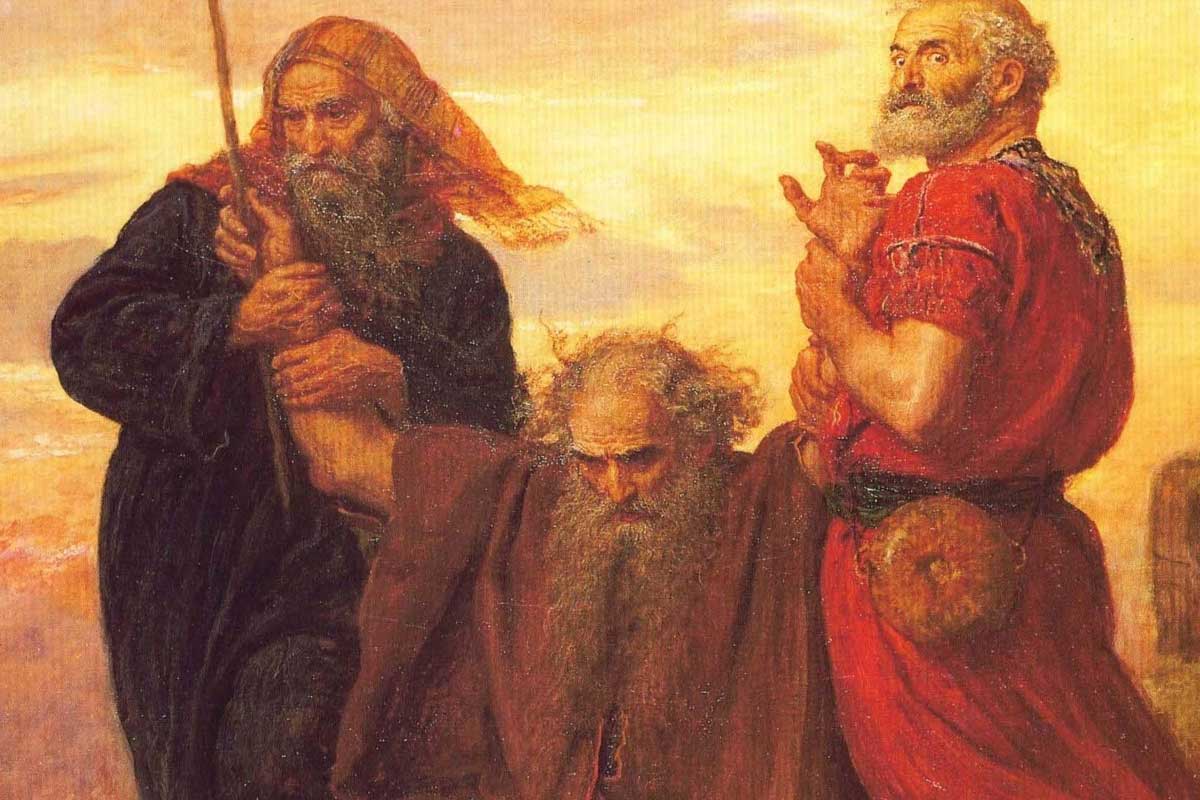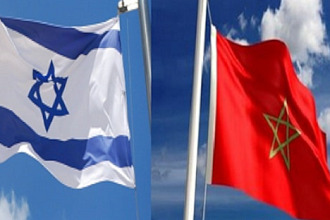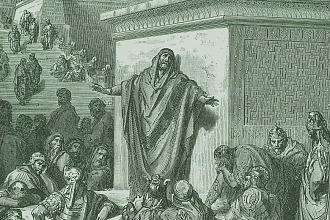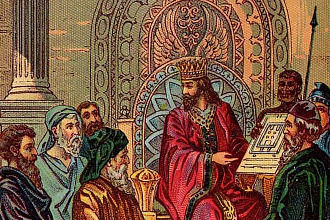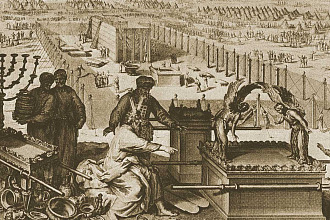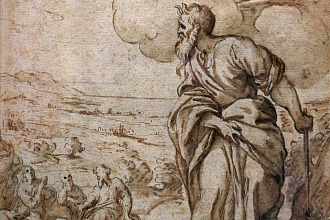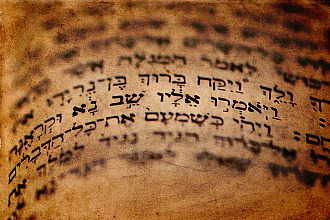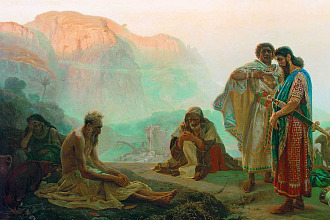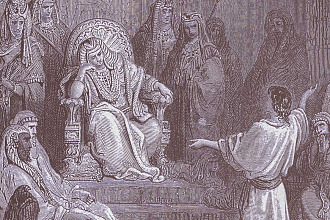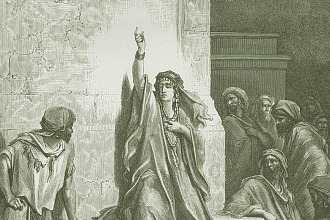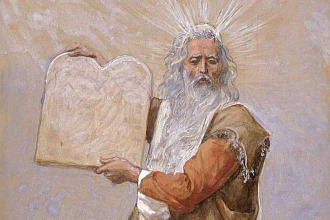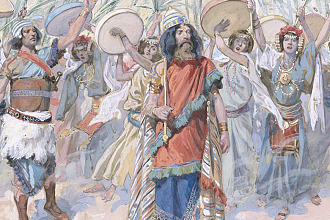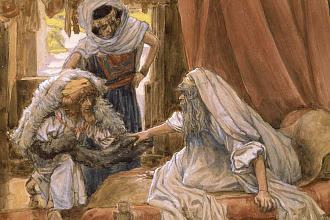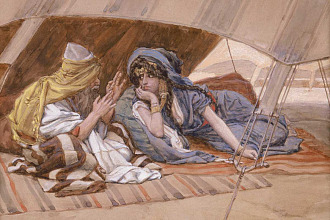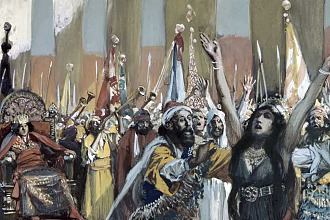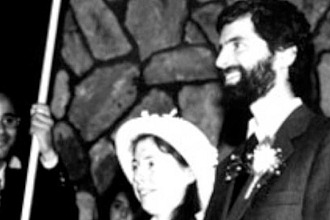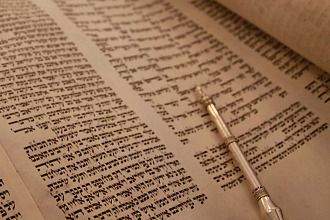In Lesson 3 we learned how God helped Joseph forgive his brothers. God worked though Joseph to bring his own family into Egypt. We will now discover what became of this great family, the Israelites.
Can you imagine being taken from your home, and then surrounded by a completely different culture? Picture fleeing for your life because of something you did. Eventually, you come to the place where you know God is the only one who can help you.
This was the experience of Moses. In the next few lessons we will come to appreciate how God used Moses as His temple builder, torah writer, lawgiver, health educator and deliverer. In this lesson we will read how Moses was used to deliver God’s people from Egyptian bondage. We will also see 15 points of how Moses is the representative of the Great Deliverer, the Messiah.
1. Many years after Joseph died a new king arose in Egypt. How did he treat the Israelites?
Joseph died...and all that generation. But the Israelites... multiplied and increased very greatly.... A new king arose over Egypt who did not know Joseph...he said “Let us deal shrewdly with them, so that they may not increase; “...set taskmasters over them to oppress them with forced labor... “When you deliver the Hebrew women, look at the birthstool: if it is a boy, kill him.” Exodus 1:6, 7, 8, 10, 11, 15
Point A: He was born at a time when Jewish boys were being killed.
2. Under these horrible conditions, how did God miraculously save Moses from death when he was a baby?
The woman conceived and...hid him for three months. When she could hide him no longer, she got a wicker basket for him... She put the child into it and placed it among the reeds by the bank of the Nile...the daughter of Pharaoh came down to bathe... She spied the basket... When she opened it, she saw that it was a child, a boy crying. She took pity on it and said, “This must be a Hebrew child.” Then his sister said to Pharaoh’s daughter, “Shall I go and get you a Hebrew nurse to suckle the child for you?” And Pharaoh’s daughter said to her, “Yes.” So the girl went and called the child’s mother. And Pharaoh’s daughter said to her, “Take this child and nurse it for me, and I will pay your wages.” So the woman took the child and nursed it. When the child grew up, she brought him to Pharaoh’s daughter, who made him her son. Exodus 2:2-9
Point B: He was saved from death as a baby.
3. Moses grew to manhood. He knew that he was Jewish. How did he attempt, in his own strength, to deliver the Jewish people from bondage?
He went out to his kinsfolk and witnessed their labors. He saw an Egyptian beating a Hebrew, one of his kinsmen. He turned this way and that and, seeing no one about, he struck down the Egyptian and hid him in the sand.Exodus 2:11-12
4. What was the result of Moses’ decision to use his own strength, rather than wait for God to reveal how He was going to use Moses to deliver us?
When Pharaoh learned of the matter, he sought to kill Moses; but Moses fled from Pharaoh. He arrived in the land of Midian. Exodus 2:15
Moses made the same mistake that Abraham and Jacob made of trying to fulfill God’s will by his own power.
5. What important lesson did Moses need to learn in the wilderness before God could use him as His deliverer?
“Not by might, nor by power, but by My spirit--said the LORD of Hosts.” Zechariah 4:6
It is not by our might, our power, our intellectual abilities, our talents, our skills, or our wisdom that things for God are ultimately accomplished; but it is by the Lord’s Spirit working through us that brings about any accomplishments, good actions, righteous deeds, mitzvahs, and acts of loving-kindness.
6. After being in the land of Midian for 40 years God spoke to Moses in a unique way and summoned him to deliver the children of Israel out of bondage.
God called to him out of the bush: “Moses!...I am,” He said, “the God of your father, the God of Abraham, the God of Isaac, and the God of Jacob...I have marked well the plight of My people...yes, I am mindful of their sufferings. I have come down to rescue them...I will send you...and you shall free My people...” Exodus 3:4,6,7,8
Point C: He was called by God to deliver His people out of bondage.
7. No longer self assertive, how did Moses humbly respond?
Moses said to God, “Who am I that I should go...?” Exodus 3:11
8. How did God respond to Moses’ fear, and what did God want the children of Israel to do when we were freed?
And He said, “I will be with you... And when you have freed the people...you shall worship God...” Exodus 3:12
Point D: He led people to worship God.
9. After the ten plagues fell upon Egypt the children of Israel were set free. God led us to the Red Sea. When Pharaoh’s army came out after us, what did we say to Moses that revealed our lack of faith?
“Was it for want of graves in Egypt that you brought us to die in the wilderness? What have you done to us, taking us out of Egypt? Is this not the very thing we told you in Egypt, saying, ’Let us be, and we will serve the Egyptians, for it is better for us to serve the Egyptians than to die in the wilderness?” Exodus 14:11,12
Seeing miracles is not enough in themselves to give us faith to stand during times of trouble. Like Abraham Jacob, Joseph, and Moses, we need to learn to trust God in all things and fall in love with Him.
10. What was Moses’ response to our distrust?
But Moses said to the people, “Have no fear! Stand by, and witness the deliverance which the Lord will work for you today... The Lord will battle for you; you hold your peace.” Exodus 14:13
In the face of destruction Moses’ faith stood firm because he had learned to make God his strength. God performed the miracle of parting the waters and brought the children of Israel across the Red Sea on dry land. As Pharaoh’s army tried to chase down the children of Israel, God allowed the sea to return to its natural state and all of Pharaoh’s soldiers drowned in the sea.
Point E: He performed miracles.
11. Soon after this powerful experience the children of Israel arrived at Mt Sinai. This is where God called Moses up to the mountain top for 40 days of fasting and communing with Him. During this time, God gave Moses the 10 commandments. What type of rebellion were the children of Israel involved in while Moses was on Mt. Sinai?
When the people saw that Moses was so long in coming down from the mountain, the people gathered against Aaron and said to him, “Come, make us a God who shall go before us, for that man Moses, who brought us from the land of Egypt--we do not know what has happened to him.” Aaron...cast in a mold, and made it into a molten calf. Exodus 32:1
Point F: He fasted in the wilderness forty days and nights.
Point G: He was rejected by many of the people he tried to save.
Point H: He proclaimed the law of God to the people.
12. How did God test Moses’ faithfulness and love for the people who doubted God’s leadership?
The Lord further said to Moses, “I see that this is a stiff-necked people. Now, let Me be, that My anger may blaze forth against them and that I may destroy them, and make of you a great nation.” Exodus 32:9
13. How did Moses respond when God threatened to destroy all the people? How does this demonstrate his unselfish love for God and for them during this very time when we were rejecting him? How far was Moses willing to go for the people who are rejecting him and who God is referring to as stiff-necked?
I threw myself down before the Lord--eating no bread and drinking no water forty days and forty nights...because of the great wrong you had committed...so I...interceded...” Moses implored the Lord his God, saying, “Let not Your anger, O Lord blaze forth against Your people, whom You delivered...Now, if You will forgive their sin (well and good); but if not erase me from the record which You have written!”Deuteronomy 9:18, 20; Exodus 32:11, 32
Moses interceded for the people. Moses was willing to have his name taken out of The Book of Life for the very people who were rebelling against God. Moses was willing to be the substitute for sinners.
Point I: He interceded for the people’s sins.
Point J: He was willing to die in place of those who sinned.
14. When Moses humbly asked to behold God’s presence how did God reveal Himself to Moses?
The LORD passed before him and proclaimed; “The LORD! the LORD! a God compassionate and gracious, slow to anger, abounding in kindness and faithfulness, extending kindness to the thousandth generation, forgiving iniquity, transgression, and sin; yet He does not remit all punishment...” Exodus 34:5
Point K: He beheld God’s presence.
15. Within the first year of traveling through the wilderness we find the children of Israel rebelling against God and disobeying him. This made life extremely hard for Moses. Despite this, we see God’s servant Moses continually responding with love, mercy, patience, strength, justice and obedience to God. Moses was called the humblest man on earth (Numbers 12:3). What was one of the ways Moses showed us what humility is?
Moses said to the Lord... “Let me know Your ways, that I may know You and continue in Your favor...unless You go in the lead, do not make us leave this place.” Exodus 33:12, 13, 15
Point L: He was humble.
Moses lived 120 years. His life is divided into three 40-year periods. During the first 40 years Moses was everything. He was going to be the next Pharaoh and he was going to deliver the Jewish people. In the next 40 years Moses was nothing. He was a sheepherder in the wilderness. He responded to God’s call by saying “who am I that I should go?” In the last 40 years of Moses’ life God was everything! You and I might not be given 120 years of life. We should move to stage 3 right away by surrendering our pride and our insecurities, and allowing God to be everything.
16. What is one of the ways God described the Messiah to Moses?
The Lord said to me... “I will raise up a prophet for them from among their own people, like yourself. I will put My words in His mouth and He will speak to them all that I command Him, and if anybody fails to heed the words He speaks in My name, I Myself will call him to account.” Deuteronomy 18:17, 18, 19
Point M: He was a prophet.
Point N: He spoke God’s words in God’s name.
Point O: People were accountable for following what he said.
17. In review, there are 15 different ways Moses’ life prefigured the Messiah. What were they?
A) Born at a time when Jewish boys were being killed
B) Miraculously saved from death as a baby
C) Called by God to deliver His people out of bondage
D) Led people to worship God
E) Performed Miracles
F) Fasted in the wilderness forty days and nights
G) Was rejected by many of the people he tried to save
H) Proclaimed the law of God to the people
I) Interceded for the people’s sins
J) Was willing to die in place of those who sinned
K) Beheld God’s presence
L) Was humble
M) Was a prophet
N) Spoke God’s words in God’s name
O) People were accountable for following what he said
These are just a few of the areas that the life of the Great Deliverer, the Messiah, is foreshadowed in the Hebrew Scriptures.
God can give you the ability to be loving and persevering when facing difficult times, just as He did for Moses. Do you ever find yourself in trying circumstances, needing power to cope? God is that power and He makes Himself available to use through prayer. Just call out to Him and He will provide you with the strength that you need on a daily basis. As you draw closer to God day by day He will make Himself more and more real to you and give you humility, strength, and courage just as He gave Moses.
In your next lesson you will learn about the construction of the first Jewish temple. It was designed by God Himself and built under the leadership of Moses. With its heavenly Designer, it was no doubt the most glorious temple ever designed. Most importantly, God’s temple, like Moses’ life, prefigured the work of God for us and the Messiah.
Fill out your review sheet right now so you can study more about the Messiah foreshadowed in God’s temple in your next lesson, “Moses the Temple Builder.”
This lesson is adapted from "Jewish Discoveries," by Jeff Zaremsky, to buy the printed book, click here.

